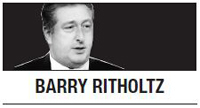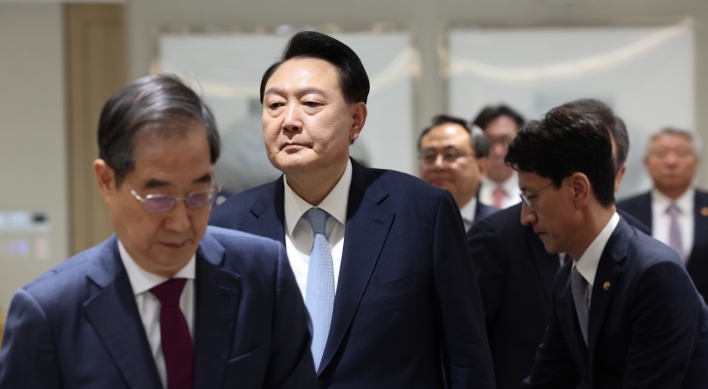[Barry Ritholtz] Rules for coping with market panic
By Korea HeraldPublished : March 12, 2020 - 17:21
 People don’t like being told what to do, and when agitated they really dislike being told to be less agitated. So rather than just tell you not to panic (seriously, DON‘T PANIC), I will offer some thoughts about what is going on today, this week and perhaps the next quarter or two. But here’s what to keep in mind: Much of this is just guesswork, and it‘s worth being skeptical of anyone who says they know how this will turn out. Let’s start with what we know so far:
People don’t like being told what to do, and when agitated they really dislike being told to be less agitated. So rather than just tell you not to panic (seriously, DON‘T PANIC), I will offer some thoughts about what is going on today, this week and perhaps the next quarter or two. But here’s what to keep in mind: Much of this is just guesswork, and it‘s worth being skeptical of anyone who says they know how this will turn out. Let’s start with what we know so far:Media coverage: There is a lot of information and misinformation in the press and especially online. All of the various techniques we have discussed over the years apply here: Read trusted sources and avoid clickbait nonsense.
Even when the press gets it right, however, it can create a false perception of what this potential pandemic is: 24/7 coverage implies that nothing else matters all that much and we all must focus incessantly on the virus. This is just one more example of our nation‘s media failing to serve us as well as it should.
And come on, stop getting your coronavirus news from Facebook; what’s right there isn’t new and what‘s new there probably isn’t right.
Markets: We all have a tendency to look at markets in the here and now; human psychology is geared to respond to immediate threats. Hence, these short-term drops need to be placed into context as follows: From the lows of December 2018, the markets have rallied roughly 35 percent; those huge gains in such a relatively short period create an air pocket, which markets have now hit.
I don’t want to understate this: The 11 percent decline in the S&P 500 in one week is big. However, the market is pricing in the likelihood of a substantial decrease in economic activity and the possibility of a global recession.
This is not 2008: Many things caused the financial crisis but the key to that debacle began with the structure of finance itself. Securitized loans were everywhere, as were derivatives. Even worse, there was a direct feedback mechanism between the economy (real estate) and finance (securitized mortgages). That tight relationship ensured that credit, finance, market structure, economics, employment and gross domestic product all were closely tied together. Although the supply chain is global and the nature of modern economies are interlinked, there is nothing that seems to be systemic this go around.
Economy: The economy is slowing, likely temporarily, but perhaps significantly, as people hunker down, work from home and go out less as they wait out the spread of the virus. Stocks are appropriately pricing this in. The assumption is energy, travel, leisure, restaurants and retail will all have large declines in revenue and profits. Historically, pandemics should be transitory, lasting weeks or months but likely not years. Knowing this should help you put the moment into context.
Investing: It may be too late to sell and too early to buy. Regardless, you shouldn’t let even a global health care panic lead you into doing something you will regret later.
It always comes down to this: Have a plan and execute it faithfully. Trying to make decisions on the fly in an emotional environment of unknown outcomes can be an expensive exercise in folly.
Trading: Assuming you have a fun trading account equal to 5 percent to 10 percent of your liquid assets, make a list of what you would like to own if it were 20 percent, 30 percent or even 40 percent lower, and be prepared to buy into a deepening retreat. Don’t pick a point, but cycle in as markets fall, then again as they recover. Look at a stock-market graph of 2008 and 2009. Now let’s assume this only gets half as bad as that, and figure out what you would like to own if it were much cheaper. Also, keep a slug of cash on hand, in case things get worse. You will not catch the bottom, and you might look foolish for a while; in a few quarters you will be grateful.
Uncertainty: No one knows what the future holds and most of the time we really do not understand what is happening in the present. But we pretend by way of series of cognitive lies, optimism and false confidence. People in business and government are no different: When they discuss “uncertainty,” that is their tacit admission they really have no clue what‘s going on.
“Don’t panic” is best advice I have ever been given; it is applicable in every situation imaginable. Panic doesn’t make anything better and often makes things worse.
To that, at this particular moment, I would add: Wash your hands like a surgeon, stop touching your face, stay home if you don‘t feel well and know that it very probably will all be fine in retrospect.
By Barry Ritholtz
Barry Ritholtz is a Bloomberg Opinion columnist. He is chairman and chief investment officer of Ritholtz Wealth Management, and was previously chief market strategist at Maxim Group. -- Ed.
(Bloomberg)
-
Articles by Korea Herald










![[KH Explains] How should Korea adjust its trade defenses against Chinese EVs?](http://res.heraldm.com/phpwas/restmb_idxmake.php?idx=644&simg=/content/image/2024/04/15/20240415050562_0.jpg&u=20240415144419)









